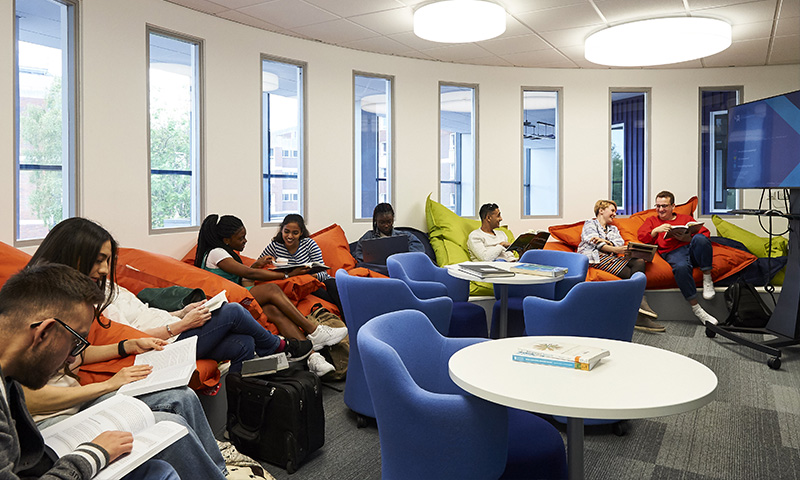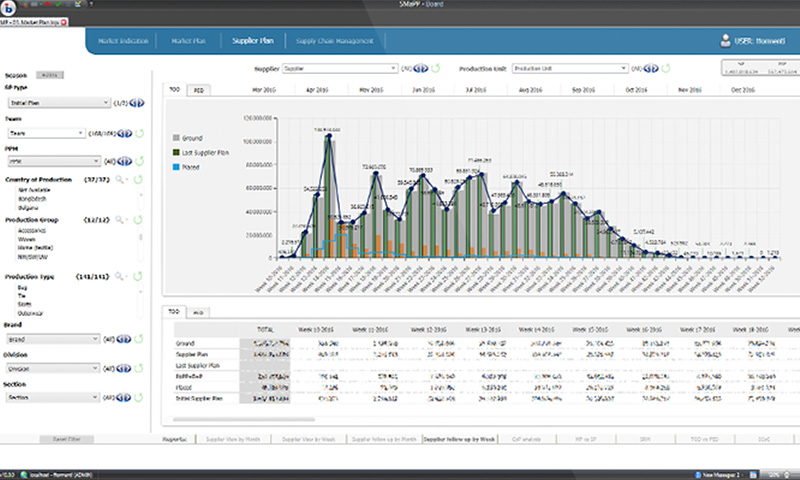Year 1 (Level 4) modules
The Responsible Business
An introduction to responsible business practices with an emphasis on professional, moral, and personal responsibility. This module will encourage the development of personal and professional development skills and self-reflection as a personal development tool.
The Innovative Business
Exploring what it takes for a business to be innovative; you will be introduced to various theoretical views and opinions in the areas of creativity, innovation, and enterprise. You will be challenged to consider where, how and why ideas are generated; how ideas are implemented; and who and what type of people/teams develop innovative ideas.
The Sustainable Business
As awareness of climate change, resource scarcity, environmental impact and social inequality rises, businesses are increasingly being held accountable by consumers, governments, and other stakeholders. The module provides a holistic view of sustainability through a global lens where you will learn how the aforementioned factors impact the way we live and how businesses operate.
Learning how businesses adopt sustainable strategies across their various business functions such as marketing, supply chain and HR, you will also explore the macro and micro influences that impact these strategies. Overall, the module will help create awareness of corporate as well as individual social responsibility through use of international case studies.
The Digital Business
The first part of this module aims to provide a practical understanding of the digital business, the need for digital transformation to support innovation and to continue to have a competitive advantage in the marketplace. The various digital business models are explored along with the importance of digital capability.
The second part of the module introduces you to the information systems that support today's digital business. A range of information systems are examined including those that support the operations of the digital business, through to its sales and marketing functions. The importance of big data and business intelligence are introduced before examining how today’s digital business can apply business intelligence to develop new products and services along with improvements in efficiency and its business processes.
Year 2 (Level 5) modules
Customer Acquisition and Retention
Exploring the customer journey from prospect or enquiry to loyal customer or advocate, you will learn about the marketing strategies and tactics involved in attracting new customers and retaining them. Research suggests it can cost between 5 and 10 times as much to acquire a new customer as it does to retain an existing one, with the commonly quoted average being 7 times more expensive to acquire a new customer.
So why do so many companies spend more time chasing new customers than keeping existing ones? This is the paradox of customer retention and acquisition. This module will enable you to understand the role of customer acquisition and retention in designing contemporary marketing strategies for organisations. You will gain practical experience of planning marketing campaigns designed to attract, win, and retain customers.
The Professional Manager and Leadership
The aim of this module is to develop your understanding of management and leadership principles, and to explore the influence various leadership and management approaches have on key human resource management functions, including change management. Through the study of emerging leadership concepts, such as super leadership, you will develop an appreciation for the development of self as a method to support others in their development. Reflective practice underpins the module to support you in assessing your own approach to learning and development.
Operations and Project Planning
Exploring operations and supply chain management, as well as the fundamentals of project management, this module aims to give you the skills required to analyse contemporary issues facing business operations and supply chain. It also exposes you to the understanding of how businesses mitigate these issues to deliver goods and services of the quality and of the right quantity to satisfy customers’ need while adopting lean business approaches.
Equipping you with team working and communication skills in a project environment, you will be able to define, plan and control projects through their life cycle, while balancing competing performance objectives and managing competing stakeholder requirements. Detailed study of management tools such as critical path analysis and PERT will be undertaken.
Managing Finance and Accounts
The aim of this module is to provide an introduction of a range of financial and accounting skills to business students, to help their understanding and managerial decision-making skills. You will evaluate the organisation’ financial statements, identify the principles for setting and managing budgets and understand finance within the organisation. This module has been designed to enhance your confidence and credibility in financial management, which will translate into improved management skills.
Year 3
Supervised work experience
The sandwich-year option represents an opportunity for you to apply and develop, through work experience, the skills and knowledge gained on your course. This module involves a year-long placement in a business related area, supported by a workplace mentor and UWBS Employability and Placement Unit (EPU), with the opportunity to gain experience of graduate level work. Employers are very keen to employ graduates who have already had work experience as part of their course and this contributes to your unique selling points.
Year 3 (Level 6) modules
The Strategic Business
The strategic business module will equip you to make strategic decisions at both a corporate and functional level. You will develop the skills required to evaluate the success of implemented strategy which will inform decision-making at a corporate and functional level.
Organisational Behaviour
Exploring current knowledge around behaviour in contemporary organisations, this module explores areas from an individual employee and manager perspective. You will engage with topics such as identity, power, gender, motivation, change, and ethics, from a critical, and in some instances, post-structuralist perspective. The aim of the module is to equip you with a fundamental grounding in organisational behaviour to help you develop into a manager of the future.
The Professional Project
On this independent study unit, you will draw learning from previous subjects, focusing on your key strengths, in the production of a business artefact. Alongside the artefact, you will develop a written critical reflection, which is designed to explain your choice of artefact and reflect on the process of its production and dissemination.
The Business Communicator
The ability to effectively communicate with all internal and external stakeholders is key for business leaders. The business environment is in constant flux, and it is important to be able to navigate this space, whilst building relationships and networks. This module will explore key communication and human resources theories and provide students with the tools to assess and develop their own communication skills.
Specialist routes:
Business Management (HR)
Strategic People Management
Explore how events and actions in the macro-environment impact upon organisations, and the strategies that organisations may adopt to manage this. You will engage with contemporary discourses around new ways of working and communicating including within dispersed collaborations, learning and development strategies to meet changing organisational needs, and creating inclusive and sustainable workplaces. You will also engage with emergent topics within the field, as organisations adapt and requirements change, impacting on organisational approaches.
People Profession – Transforming Organisations
Examine the importance of “the people profession” (human resources) in developing the organisational strategy and structure of a business. Develop your understanding of the importance of organisational strategy on structure, and the impact of organisational design, change and development in creating a sustainable business.
The Professional Project
On this independent study unit, you will draw learning from previous subjects, focusing on your key strengths, in the production of a business artefact. Alongside the artefact, you will develop a written critical reflection, which is designed to explain your choice of artefact and reflect on the process of its production and dissemination.
Transition into the Human Resources Profession
Aiming to create awareness of the changing labour market and the strategies which are necessary to maximise career progression as you transition into the HR profession, on this module you will be encouraged to consider current debates relating to the concept of employment and careers in the 21st century and apply them to the HR profession. You will critically evaluate, analyse and enhance your employability skills using a wide range of current tools, concepts, and techniques to better equip you for your future professional HR career.
Business Management (Enterprise)
Transformational Change Agent
This module will give you the opportunity to develop your own capability to analyse and identify the need for change and how this happens within organisations; revealing the complexities and difficulties associated with making change happen. You will explore both the theory and practice of change agency using different activities and case studies. You will have the opportunity to evaluate and reflect on your own potential to develop as a change agent, enhancing your self-understanding and future employability and career prospects.
Creating a Winning Business
Develop a business idea and its value proposition, identifying what is required to turn this idea into reality. You will have the opportunity to develop your creativity, enterprise skills and make use of the other necessary tools and techniques to assess the viability and market potential of the idea. This includes applied research, analysis, entrepreneurial and digital marketing, financial tools, and evaluation of the resource requirements for the start-up. This culminates in the production of a comprehensive business plan, which can be used later to launch your new business venture.
The Professional Project
On this independent study unit, you will draw learning from previous subjects, focusing on your key strengths, in the production of a business artefact. Alongside the artefact, you will develop a written critical reflection, which is designed to explain your choice of artefact and reflect on the process of its production and dissemination.
Strategy in Action
Providing the necessary tools and techniques to undertake a strategic analysis of a small or medium sized enterprise, you will evaluate its strategic position in the marketplace vis a vis competitor, craft a series of entrepreneurial and innovative strategic recommendations for the short and long-term strategic growth of the business, and address the issues relating to the management of these growth strategies.
In undertaking and completing the strategic growth plan project for a small or medium sized firm, this module not only provides you with a good understanding of the strategy process and how to develop cogent strategic recommendations, but also will enhance, through the development of your analytical skills and strategic thinking, your future employability and career prospects.
Business Management (Marketing)
Consumer Behaviour ant the Responsible Marketer
Addressing a wide range of marketing and psychological theories and concepts which help marketers to explain and analyse both consumer behaviour and online consumer behaviour, this module offers an insight into how consumers consider, buy and experience products and services. You will also explore ethical and social responsibility issues, assessing the techniques used by organisations to influence and persuade consumers to purchase. Discussions and debate around the responsibility of marketers will address contemporary cultural and social issues in marketing.
Marketing and Digital Strategy
Explore the complexities of a strategic marketing approach that every organisation needs to employ to develop and sustain competitive advantage. What influences strategic decisions, and how do organisations create and sustain competitive advantage? This module expands the knowledge and understanding of traditional and digital marketing, exploring strategic positioning of products and brands offline vs online, and assessing the role of marketing from a strategic perspective.
The Marketing Consultant
Examine the role of social media, search engines and freelance marketing in targeting and communications, especially the strategic and practical application of social media and freelance platforms, with particular focus on competitor analysis. You will gain exposure to digital marketing tools and develop capabilities in search engine optimisation (SEO), keyword research, search engine marketing (SEM) and content marketing. You will benefit from guest speakers who will share their knowledge and experience in the field of social media and freelance marketing.
The Professional Project
On this independent study unit, you will draw learning from previous subjects, focusing on your key strengths, in the production of a business artefact. Alongside the artefact, you will develop a written critical reflection, which is designed to explain your choice of artefact and reflect on the process of its production and dissemination.


/prod01/wlvacuk/media/departments/digital-content-and-communications/images-18-19/iStock-163641275.jpg)
/prod01/wlvacuk/media/departments/digital-content-and-communications/images-2024/250630-SciFest-1-group-photo-resized-800x450.png)
/prod01/wlvacuk/media/departments/digital-content-and-communications/images-18-19/210818-Iza-and-Mattia-Resized.jpg)
/prod01/wlvacuk/media/departments/digital-content-and-communications/images/Maria-Serria-(teaser-image).jpg)
/prod01/wlvacuk/media/departments/digital-content-and-communications/images-2024/241014-Cyber4ME-Project-Resized.jpg)
/prod01/wlvacuk/media/departments/digital-content-and-communications/images-18-19/210705-bric_LAND_ATTIC_v2_resized.jpg)





